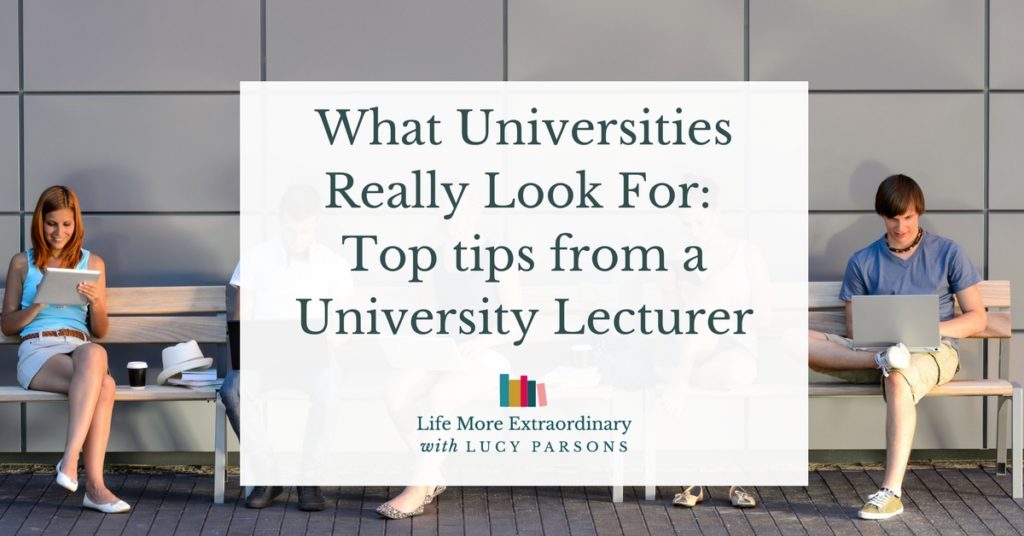What universities really look for: Top tips from a University Lecturer

If you’re applying to university you’re probably slightly befuddled about what lecturers and admissions tutors are actually looking for. That’s why I was so excited to speak to Eleanor Snare, teaching fellow at the School of Design at the University of Leeds. Eleanor teaches third year students, supervises dissertations, and is heavily involved with open days, creative careers and the admissions process.
Eleanor and I have such similar opinions about what it takes to write a stand out UCAS personal statement. Read on to find out how to get yourself noticed.
What universities really look for
Eleanor explained to me that the University of Leeds, as part of the Russell Group of leading universities, attracts academically gifted students. Many of these students have achieved highly in their A Levels and have often been awarded prizes.
However, when they get to university they suddenly realise that they’re a little fish in a big pond. They’ve gone from being a high achiever to just another student.
This is very uncomfortable for them and it takes time and a complete mindset change to adjust to the demands of university learning.
Eleanor said, “We’re looking for creative thinkers, people who can think on their feet and solve problems. Most of all we’re interested in your passion for learning and where you are on your learning journey.”
So, how can you get ahead and be ready for this mindset change?
There’s lots you can do while you’re still at school, preparing for your UCAS application, to prepare yourself for this different culture of learning.
Eleanor talked about things like being part of a sports team or running a guide or scout pack.
However, she says that you shouldn’t stop at the things that are socially available to you. Go further by finding creative and independent projects that light your fire. Eleanor’s interest is sparked by students who’ve started (and stayed committed to) their own blog, created an amazing instagram feed, written loads of short stories or found some other way to express who they are as a person.
As Eleanor says, “Find your little project. Go above and beyond.”
Talk about your learning journey, not your career path
My favourite part of my conversation with Eleanor was our meeting of minds on the purpose of university. Unlike the popular, cultural belief that you go to university to get a job, both Eleanor and I know that university is about learning.
Eleanor said, “ I’m not interested in what specific job you want to do. I want to know what you want to learn. University is a pathway to education and a new way of seeing the world.”
What universities really look for: Top tips from a University Lecturer Share on XAt university you learn to think creatively and disruptively. Often, this isn’t very attractive to employers in entry-level graduate jobs. However, it’s this intellectual flexibility (that you will get from studying any subject) that will mark you out from the non-graduates in the world. This is why I believe that you can't put a price tag on university.
As Eleanor told me about her own first job, “They were interested in what I had done both in and out of university, and who I was, not in my degree.”
My own experience supports this. A head-hunter found me for my first graduate job because of what I’d been doing outside my degree at university and what that said about me as a person – they couldn’t have cared less whether I’d studied geography or maths.
How can you show all this off in your personal statement?
It’s one thing having all these great things to write about. It’s quite another actually putting it down on paper in an authentic and interesting way.
Eleanor’s advice is to practice writing about yourself. Show pride in your achievements and demonstrate your learning journey, where it’s taken you so far and where you’d like it to go in the future. She said, “Show you’re learning, trying difficult and new things. Not to show you’re the best, but to show that you’re reflecting on the things you’ve learned.”
“What was interesting about it? What hooked you? Why do you want to explore it further? What’s your genuine interest in this? What are the links between the disparate things that you’ve studied?”
When you start writing down the answers to these questions, not a in formal way as part of your personal statement, but free-writing your ideas you will find new and interesting answers and connections and new ways of expressing the thoroughly fascinating person that is you.
My e-course on how to write a personal statement helps you go through this free-writing process. The first of the three modules is all about free writing about all your experiences so that you can practice how you communicate what you've done in a low-pressure way.
In conclusion: Be fascinating, not dull
As Eleanor said about university dissertations, “I don’t want to read something dull. Being interesting isn’t one of the formal criteria, but it’s important for university and for life. Intrigue yourself and intrigue your tutor.”
If you can apply this philosophy to your personal statement you’ll be on to a winner. If you're intimidated by the idea of writing about yourself in a fascinating and intriguing way, you need to check out my e-course on writing personal statements, Your Complete Guide to a Winning Personal Statement. It will show you how to craft everything from a compelling opening sentence to a closing paragraph that leaves the admissions tutor wanting more. You'll also see how to create the perfect flow and structure your personal statement in the perfect way for your life experiences and aptitudes.
 Eleanor Snare is a Teaching Fellow at the University of Leeds and runs her own marketing consultancy for creative businesses. Since graduating with an MA in History of Art (Distinction), she’s worked with over 40 businesses to create successful marketing. She is a guest lecturer at the Centre for Sustainable Fashion at London College of Fashion and has spoken at conferences in New York, Milan and Stockholm. You can find out more about her on her website, www.eleanorsnare.com, or chat to her on Twitter @ebsnare.
Eleanor Snare is a Teaching Fellow at the University of Leeds and runs her own marketing consultancy for creative businesses. Since graduating with an MA in History of Art (Distinction), she’s worked with over 40 businesses to create successful marketing. She is a guest lecturer at the Centre for Sustainable Fashion at London College of Fashion and has spoken at conferences in New York, Milan and Stockholm. You can find out more about her on her website, www.eleanorsnare.com, or chat to her on Twitter @ebsnare.

